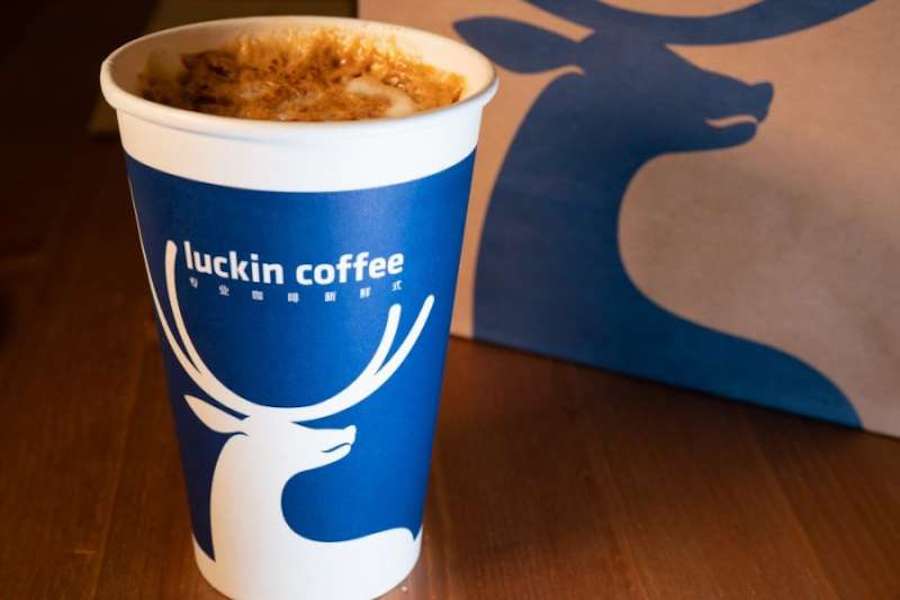Luckin, China’s upstart coffee brand, has an audacious plan: convince China to switch from tea to coffee, overtaking Starbucks while they’re at it. It’s an expensive proposition, so they’re relying on an IPO — and a Silicon Valley mindset.
“Technology is the core of our business,” Luckin Coffee, the young unicorn that emerged last year as a challenger to Starbucks in China, says in the prospectus it filed with the SEC this week, reportedly seeking to raise $800 million for a $5 billion valuation. Casual observers might have suspected that “coffee” would be the core of the company’s business, but Luckin has always acted more like a tech startup than a coffee house.
Founded in 2017 by CEO Jenny Qian, the former COO of Uber-rival UCAR, Luckin is the pioneer of a web-centric business model that has facilitated the company’s rapid expansion. Customers order coffee online and pay through mobile wallets, such as WeChat Pay or Alipay. Couriers then rush the coffee to wherever the customer is, or the customer can collect their joe to-go from a nearby Luckin location.
Taking cues from the Silicon Valley playbook, Luckin has burned through hundreds of millions of dollars to fuel an aggressive expansion plan, subsidizing prices to attract customers and opening 2,370 stores in less than two years. Of those locations, only 109 are so-called “Relax Stores,” where customers can actually sit-in and sip their brew — the rest are dedicated to churning out takeaway orders.
Luckin’s lack of sit-in cafes has kept the company’s overheads relatively low, but the bubbling start up is still deep in the red. According to the company’s prospectus, Luckin recorded net losses of $241 million in 2018 – its first full year of operations – and lost a further $82 million in the first quarter this year. CEO Jenny Qian has previously said Luckin is in “no rush to make a profit” but, evidently, the company is in serious need of cash.
The coffeehouse wants to be China’s largest coffee chain by the end of the year, surpassing Starbucks in store numbers, which requires some serious funding. The Seattle siren currently operates over 3,600 stores in China, including the world’s largest Starbucks, and is growing at a staggering rate of one new location every 15 hours.
Overtaking the brand would require beating Starbucks at more than coffee. The Seattle-based coffee chain has thrived in China less through selling coffee, and more through offering a “third space” to relax between work and home, while also offering tea-based beverages, and the status associated with buying from a foreign brand. On the other hand, Starbucks is expensive, with the average salary equivalent to 200 lattes per month — in the U.S., the average wage buys 1,000.
But adding more Luckin stores isn’t just about making coffee cheaper, or even beating Starbucks — it’s about convincing China to drink more coffee, when coffee is still relatively niche beverage choice. According to a Frost & Sullivan report, which Luckin cites in its prospectus, China’s per capita coffee consumption is just 6.2 cups a year, compared to 388 in the U.S. or 867 in Germany. Even among China’s coffee drinkers, the majority choose bottled or powdered coffee over fresh-brewed cups.
“Luckin is making a herculean effort to get more Chinese to drink coffee,” says Jeffrey Towson, a professor of investment at Peking University. Luckin believes that by making fresh-brewed coffee more convenient, it can lure the mass market towards the bitter brew. “But the question is, are Chinese actually going to drink more? Because there’s an argument that says if it hasn’t happened already, there’s probably a good reason why.”
A lot of that likely has to do with affordability and convenience, but it’s also a matter of taste: can a nation of committed tea-drinkers really see the value in switching to coffee?
Luckin’s prospectus warns potential buyers that the company might never reach profitability, in part because it can’t guarantee more consumers will make the switch. If Luckin does succeed in expanding the market, its next challenge will be retaining control of it. The start up’s business model, while innovative, is highly imitable and Luckin’s biggest rival is already taking notes.
Last year, Starbucks partnered with Alibaba’s food delivery service Ele.me to run deliveries from 2,100 stores. In Starbucks’ Q2 earnings call this week, CEO Kevin Johnson said the company will roll out mobile order and payment options in China by the end of fiscal 2019 too. Starbucks’ Q2 earnings also revealed same store sales growth of 3% in China, while Luckin’s prospectus doesn’t have a figure for same store sales – perhaps because so many of its stores are less than a year old. Luckin also relies heavily on discounts and vouchers to attract new customers, resulting in a significant proportion of customers dropping off once the introductory offers expire.
Yet major investors are still piling in to back Luckin. Just this month, BlackRock led a $150 million funding round that valued the coffee maker at $2.9 billion. Whether Luckin is brewing a viable business model beneath its hype remains to be seen. Buyers should be careful they don’t get burned.






